Fujitsu ActivateNow Technology Summit Silicon Valley 2024
“AI-Driven Transformation: Morphing Challenges into Opportunities”
April 16, 2024
Japanese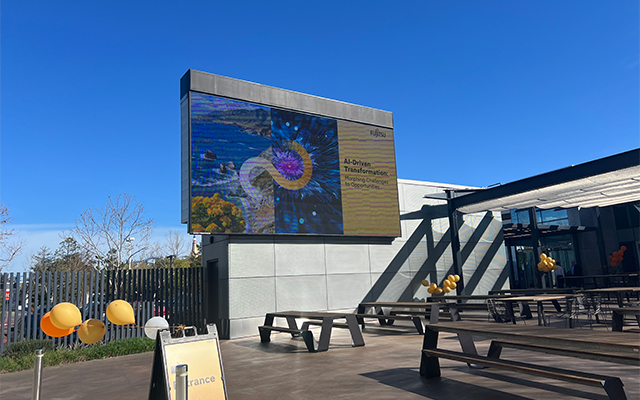
On March 13, 2024, we kicked off our Fujitsu ActivateNow Technology Summit in Silicon Valley, right in the heart of Santa Clara, California. This event marked a special occasion as it was one of the first gatherings at our brand-new Fujitsu Research of America office, which we opened in December 2023. This year's theme was all about "AI-Driven Transformation: Morphing Challenges into Opportunities," focusing on how cutting-edge technologies, especially artificial intelligence (AI) and computing, are reshaping industries.
The summit was an exclusive, invite-only affair that brought together the brightest minds in the industry, including experts, thought leaders, our industry partners, valued clients, and academic friends. It was a day filled with engaging talks, interactive sessions, and panel discussions that not only provided deep insights into the transformative power of AI and computing but also sparked lively conversations and idea-sharing among attendees.
Fujitsu's Technological Transformation: Pioneering a Sustainable Future
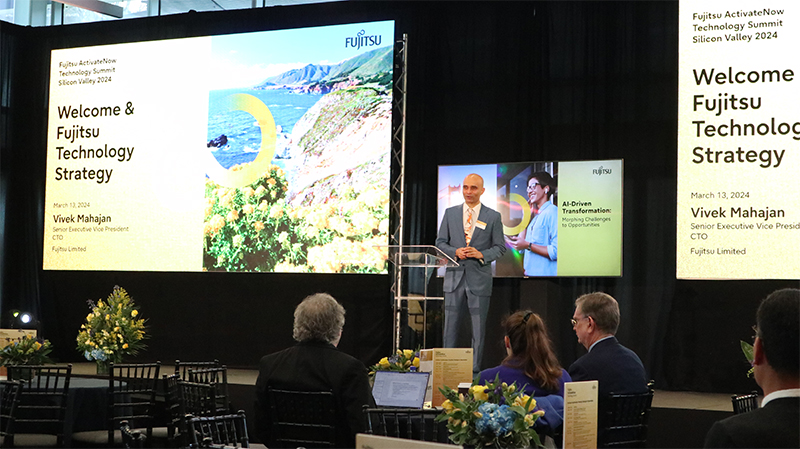
At the Fujitsu ActivateNow Technology Summit Silicon Valley 2024, Vivek Mahajan, Fujitsu's Senior Executive Vice President and CTO, delivered a compelling keynote that underscored Fujitsu's evolution into a technology and research leader, committed to fostering a sustainable and human-centric future. The presentation highlighted the critical turning point humanity faces, transitioning from global warming to "global boiling," with 2023 marking a year of record-high temperatures. This environmental crisis, coupled with the rapid advancement of AI, which is poised to generate up to $4.4 trillion in global productivity gains, sets the stage for Fujitsu's strategic focus.
Fujitsu's technology vision integrates a broad spectrum of technologies, including High-Performance Computing (HPC), Quantum Computing, AI innovations like semantic graphs and generative AI, and network advancements. These technologies are not just theoretical but are actively driving AI innovation across various applications, from data analytics to solving societal issues. A notable example is the delivery of a new supercomputer system to the Japan Meteorological Agency, which enhanced the prediction accuracy for severe weather events and demonstrated Fujitsu's commitment to leveraging technology for disaster prevention.
The presentation also introduced the Fujitsu Arm Processor "FUJITSU-MONAKA," which employs a 3D many-core architecture for high performance and low power consumption, aligning with Fujitsu's sustainability goals. On the quantum computing front, Fujitsu has made significant strides with the introduction of Japan's first 64-qubit quantum computer and the development of a quantum simulator for practical applications in various fields.
In the realm of AI and machine learning, Fujitsu unveiled the comprehensive AI platform Fujitsu Kozuchi, focusing on large enterprise needs and innovations in AutoML, generative AI, and AI trust. Fujitsu's unique generative AI amalgamation technology, which combines multiple AI models to solve complex problems, underscores our company's leadership in AI innovation.
Mahajan concluded that Fujitsu's technology summit was not only meant to be a showcase of the company's latest achievements but also a call to action. He encouraged participants to embrace technology to solve critical global issues and to contribute to technological advancements. Fujitsu stands ready to lead the way in creating a sustainable world, harnessing the power of AI, quantum computing, and digital transformation to make a positive impact on the planet and its people.
Open Challenges and Future Prospects for AI Research
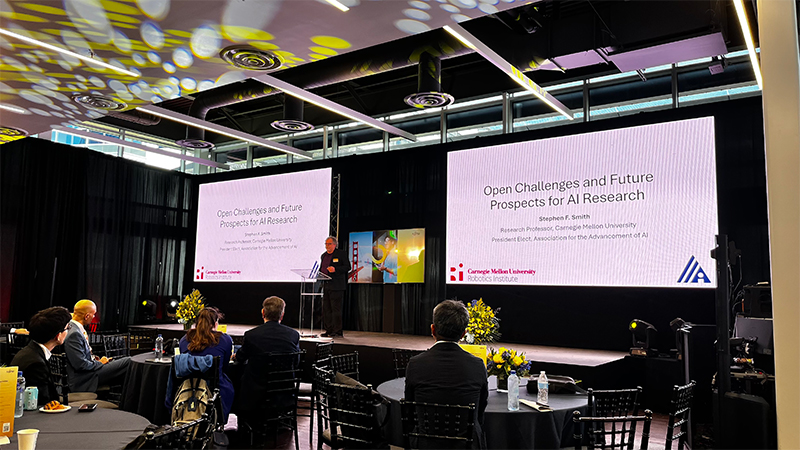
We were privileged to host two guest keynote presentations. The first of these enlightening talks was delivered by Professor Stephen F. Smith from Carnegie Mellon University, who leads the Intelligent Coordination and Logistics Laboratory. Professor Smith provided a comprehensive overview of the evolution of AI, highlighting the significant milestones and the challenges that have shaped its development.
In his retrospective on AI, Professor Smith discussed the emergence and growth of Large Language Models (LLMs), attributing their rapid development to the vast amounts of labeled data available on the internet since the 2000s and the advent of powerful hardware in the 2010s. He identified five critical challenges facing the pursuit of Human-Level AI, particularly from the perspectives of Common Sense and Reasoning. He noted that while LLMs have shown remarkable capabilities, they remain prone to manipulation and often lack the commonsense reasoning that is intrinsic to human intelligence. Professor Smith argued that simply scaling up these models may not be sufficient to overcome these limitations.
Despite these challenges, Professor Smith's outlook on the future of AI was decidedly optimistic. He acknowledged the potential of Generative AI as a significant player in the AI landscape but emphasized that it represents just one facet of the broader spectrum of AI research that demands attention. He underscored the importance of pursuing a balanced approach to AI development, one that encompasses various areas of research to achieve a more comprehensive understanding and application of AI technologies.
Moreover, Professor Smith highlighted the critical role of responsible AI use, calling on researchers, developers, and companies to adopt ethical practices in the development and deployment of AI systems. He stressed the need for vigilance against misuse and the implementation of measures to mitigate potential negative consequences, underscoring the collective responsibility of the AI community to ensure that AI technologies are used for the betterment of society.
Panel Session 1: Role of Generative AI in AI-Driven Transforming Initiatives
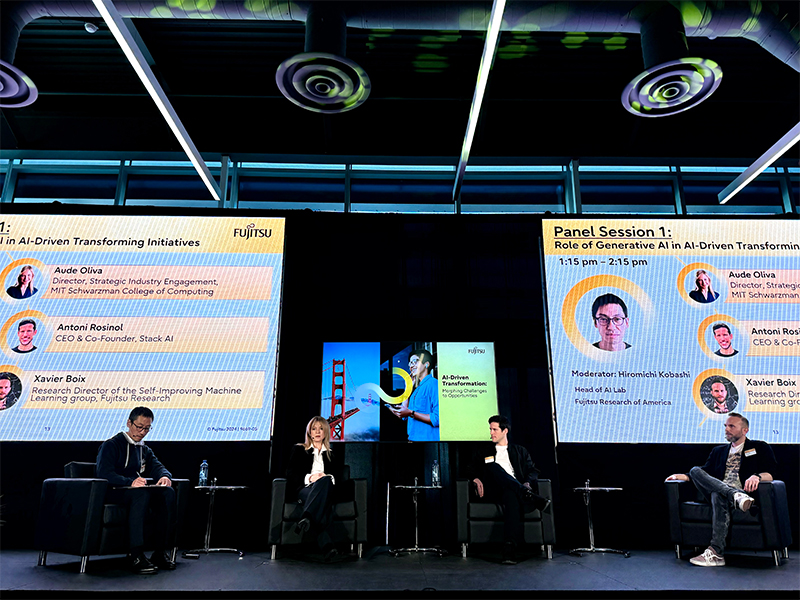
During our Fujitsu ActivateNow Technology Summit, we were excited to host the first panel session titled "Role of Generative AI in AI-Driven Transforming Initiatives," moderated by Hiro Kobashi, Head of Artificial Intelligence Lab at Fujitsu Research of America. The session featured an engaging discussion among esteemed panelists: Ms. Aude Oliva from MIT, Antoni Rosinol, CEO/Co-Founder of Stack AI, and Xavier Boix, Research Director from Fujitsu Research of America (FRA). Together, they delved into the intricacies of Generative AI, sharing their diverse perspectives on its capabilities, potential applications, and the ethical considerations surrounding its development and use.
The conversation kicked off with a debate on the quest for Artificial General Intelligence (AGI), with panelists presenting contrasting views on whether current Generative AI techniques are paving the way towards achieving AGI. With a variety of viewpoints shared, there was a consensus on the importance of implementing fact-checking tools and establishing ethical guidelines to mitigate issues like hallucinations, which are seen as inherent to Generative AI. The panelists acknowledged the challenges posed by Generative AI, especially in terms of hallucination risks and the significant computing resources required. However, they emphasized the need to explore its social implications to ensure its safe and ethical application in the future.
The discussion also highlighted the paradox of having access to vast amounts of data while facing challenges in data ingestion and processing due to data governance and privacy concerns. The panelists explored AI technology's potential to shape the success of various applications and its impact on human behavior. They stressed the importance of capturing institutional knowledge in decision-making processes and the role of collaboration and innovation in driving technological advancements.
In conclusion, the panelists agreed that while technology may never fully replicate human intelligence, we must continue to explore and innovate within the realm of Generative AI. By focusing on creative content generation and the analysis of diverse data sets, we can better cater to our evolving needs and ensure the responsible development and deployment of AI technologies.
Panel Session 2: Regenerative Society Empowered by Converging Technologies
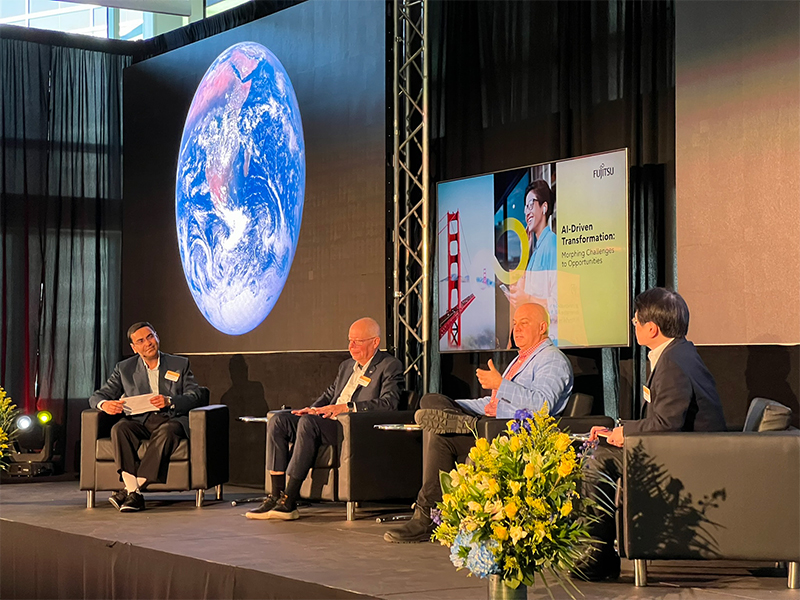
During our second panel session at the Fujitsu ActivateNow Technology Summit, titled "Regenerative Society Empowered by Converging Technologies," we had the privilege of hosting a thought-provoking discussion led by Indradeep Ghosh, CEO of Fujitsu Research of America. Our esteemed panelists included Prof. Eric Paulos from the University of California, Berkeley, Michael Hesse, Director of the Science Directorate at NASA Ames Research Center, and Daiki Masumoto, Fellow, SVP & Head of Converging Technologies Lab at Fujitsu Research, Fujitsu.
The panel delved into the critical role of digital twins and advanced technologies in environmental modeling and sustainability. Michael Hesse highlighted the innovative use of digital twins to simulate complex ecosystems and the application of satellite data for monitoring carbon dioxide emissions. This approach not only enhances our understanding of environmental impacts but also paves the way for advancements in sustainable materials, such as compostable supercapacitors and recyclable electronics, which Prof. Eric Paulos passionately discussed. Additionally, Daiki Masumoto highlighted several ongoing projects at Fujitsu, which are in progress with plans for future implementation in Fujitsu Uvance. These include monitoring potential traffic accidents at our CMU Lab, advancing green transportation initiatives at our Fujitsu Europe Lab, and pursuing decarbonization efforts at our Fujitsu Kawasaki Lab in Japan. Addressing the complexities of social dynamics and human behavior modeling, the panelists acknowledged the inherent challenges but also recognized the transformative potential of AI-driven simulations. These technologies offer a promising avenue for capturing societal trends, thereby assisting policymakers in making informed decisions related to climate change mitigation and resource management.
A recurring theme throughout the discussion was the paramount importance of interdisciplinary collaboration and the integration of AI and data-driven approaches. Drawing insights from various fields, the panelists emphasized the need to develop holistic and effective solutions to today's global challenges.
In summary, the panel session illuminated the transformative potential of digital technology across diverse domains, from wearable technology to environmental sustainability. It underscored the necessity of collaborative efforts and innovative thinking to harness these technologies for the betterment of society and the environment. Our conversation was a testament to the power of converging technologies in driving meaningful innovation and fostering a regenerative society.
Quantum Computing Cosmology: Computing the Universe
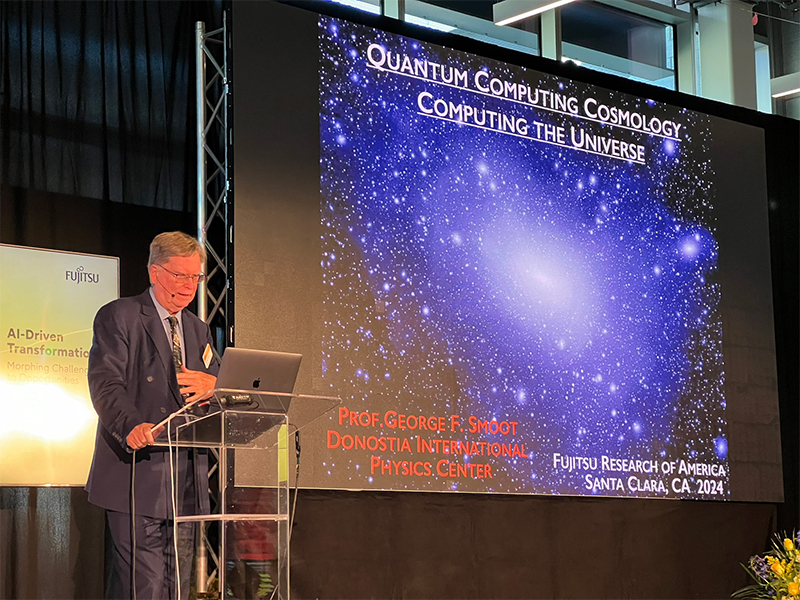
During our afternoon keynote at the Fujitsu ActivateNow Technology Summit, we were honored to have Professor George Smoot, a Nobel laureate in Physics from the University of California, Berkeley, share his profound insights into the cosmos and the role of advanced computing in astrophysics. Professor Smoot's presentation delved into the complexities of the universe, from the distribution of galaxies to the enigmatic nature of dark matter and dark energy, all through the lens of high-power computing and quantum mechanics.
Professor Smoot highlighted the critical importance of large datasets and sophisticated computer systems in tackling some of the most intricate problems in astrophysics. He discussed how these tools enable scientists to simulate the formation of galaxies and stars, offering a window into the processes that shaped our universe. Professor Smoot also mentioned the use of approximate algorithms, which enable researchers to find solutions to complex problems, especially when dealing with the vast amounts of data these simulations generate.
A significant portion of the talk was dedicated to the study of the distribution of galaxies, the cosmic microwave background, dark matter, and dark energy. Professor Smoot emphasized the challenges of multidimensional analysis in comparing observations with simulations to identify the best-fitting models of the universe. He intriguingly touched upon the implications of quantum mechanics on concepts like human teleportation, drawing parallels with popular culture references like Star Trek while grounding the discussion in theoretical physics.
The keynote further explored theoretical models of the universe, particularly the Lambda Cold Dark Matter (LCDM) model, which provides a framework for understanding the universe's composition and evolution. Professor Smoot showcased detailed computer simulations depicting galaxies' formation and the universe's large-scale structure, underscoring the importance of aligning these simulations with observational data to validate theoretical models.
One of the more pressing issues discussed was the "dwarf galaxy problem," which highlights discrepancies between the observed number of dwarf galaxies and the predictions made by collisionless numerical cosmological simulations. This problem raises questions about our understanding of dark matter and the formation of galaxies.
Professor Smoot also introduced the concept of gravitational lensing and its significance in studying galaxy formation from dark matter halos. This phenomenon, where the gravitational field of a massive object warps the space around it, causing light from a background object to be deflected and magnified, offers valuable insights into the distribution of dark matter in the universe.
In summary, Professor Smoot's presentation at the summit was a captivating journey through the cosmos, blending theoretical concepts with the practical applications of high-power computing and quantum mechanics in astrophysics. His talk not only highlighted the complexity of modern astrophysics research but also the indispensable tools used to unravel the mysteries of the universe.
Wrap-up and Closing Remarks
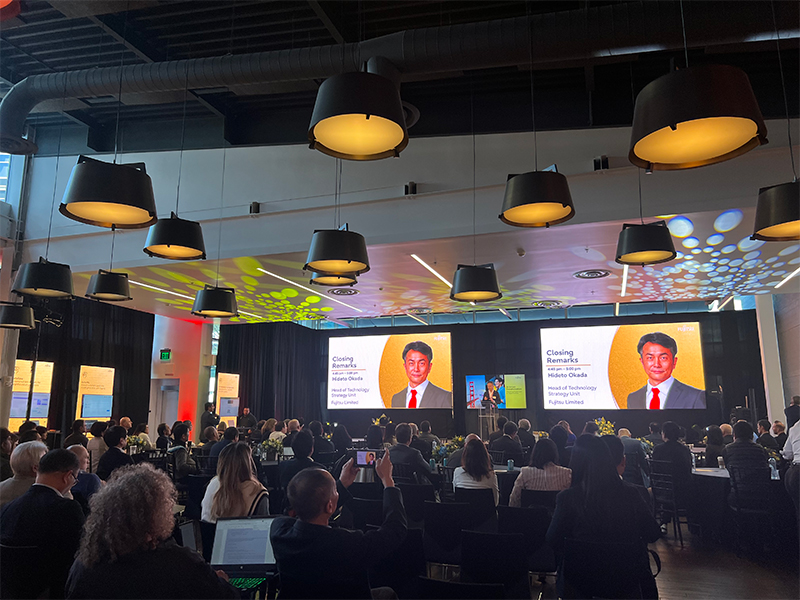
In the closing remarks of the Fujitsu ActivateNow Technology Summit 2024, Hideto Okada reflected on the day's profound discussions and insights, emphasizing the theme "AI-Driven Transformation: Morphing Challenges into Opportunities." He highlighted the summit's success in providing meaningful insights into AI technology, far beyond the usual buzzwords, and stressed Fujitsu's commitment to leveraging technology for a sustainable society benefiting humanity.
Okada recapped the morning session, during which Fujitsu's CTO, Vivek, outlined the company's technology strategy toward sustainability. He showcased progress with 7,000 AI use cases and innovations like the AI platform Kozuchi, Generative AI Amalgamation Technology, AI Computing Broker, quantum simulators, and quantum computing. He also touched on Professor Smith's keynote, which tempered excitement around AI advancements with a reminder of the long journey ahead to achieve Artificial General Intelligence, emphasizing the need to minimize risks associated with AI systems.
The first panel discussion was highlighted, focusing on the transformative potential of Generative AI in workflow automation, content generation, and knowledge management, while also addressing sustainability, safety, and ethics. The second panel was noted for its exploration of digital technologies combined with human modeling for a regenerative society, with examples from NASA's digital twin projects, Fujitsu's Social Digital Twin, and Behavior Transformation initiatives.
Professor Smoot's keynote on high-performance computing in cosmology was also recapped, highlighting how simulations contribute to our understanding of the universe. Okada encouraged attendees to explore the Technology Showcase for a firsthand look at Fujitsu's latest advancements.
In closing, Okada thanked everyone for their participation and the event staff for their hard work, expressing excitement for our transformative journey ahead with technology.
The Impact of Technology on Shaping Our Future
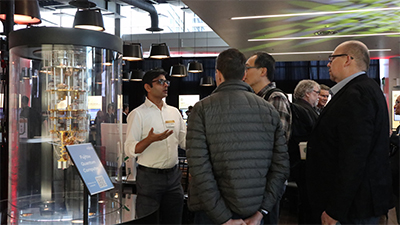
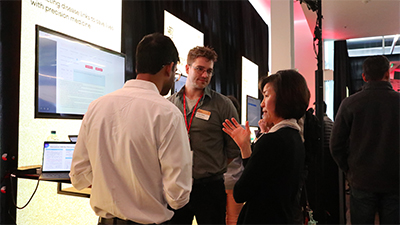
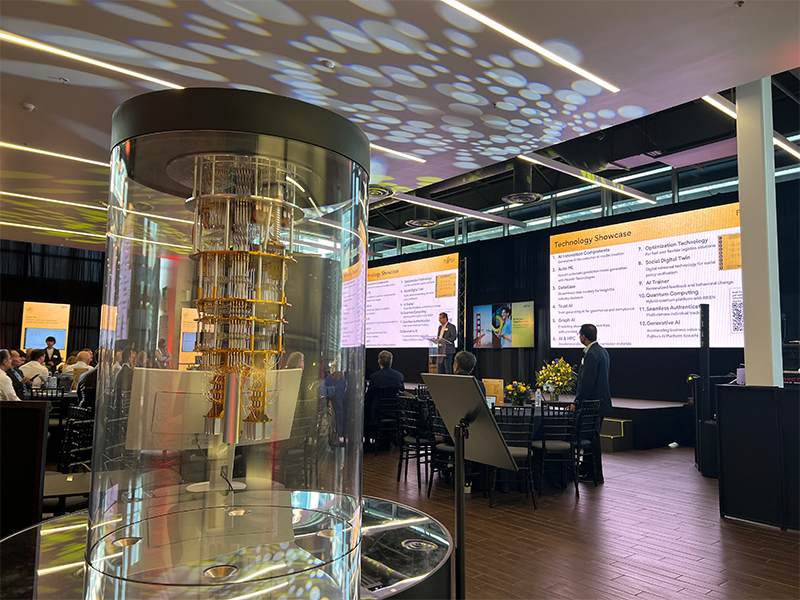
At the Fujitsu ActivateNow Technology Summit, we were thrilled to present an exhibition featuring 12 cutting-edge technology showcases, each demonstrating Fujitsu's commitment to harnessing technology for a sustainable future. These showcases spanned key areas such as Computing, AI, Data & Security, and Converging Technologies, igniting industry-centric discussions and exploring potential Proof of Concept (PoC) initiatives.
One highlight was our "AI Innovation Components," where we demonstrated the use of generative AI to create customized AI models for customers. These models integrate seamlessly with existing solutions, enabling the automatic development of AI components for swift responses to customer demands. Another showcase, "Trust AI," illustrated our commitment to adhering to human values, promoting effective governance of AI systems, offering automated risk management solutions, and expediting compliance with upcoming regulations.
Our collaboration with Palantir Technologies on "Auto ML: Kozuchi" showcased a new AI platform that enhances decision-making, efficiency, and cost reduction across businesses and healthcare organizations. "DataEase" simplified data analysis, recommending algorithms and ensuring data quality for insightful industry decisions. Meanwhile, "Graph AI" leveraged precision medicine to predict the relationship between genetic mutations and diseases, enabling more precise treatments.
The combination of high-performance computing (HPC) and AI in "AI & HPC" accelerated the discovery of zero-emission materials through quantum chemical simulations. Our "Optimization Technology" provided flexible and rapid logistics solutions, while "Social Digital Twin" offered a glimpse into digital rehearsal technology for verifying social policies before implementation.
"AI Trainer" introduced an AI that trains users and offers personalized feedback based on their psychological states to prevent fraud. The "Quantum Computing" showcase featured a half-scale mock-up of a superconducting quantum computer, highlighting our collaboration with RIKEN on a hybrid quantum platform. "Seamless Authentication" demonstrated multi-camera individual tracking for continuous authentication across services. Lastly, "Generative AI" showcased the capabilities of Fujitsu’s AI Platform Kozuchi, focusing on Vision AI and Generative AI, including Hallucination Detection technology to boost user confidence.
These showcases not only highlighted Fujitsu's technological proficiency but also underscored our dedication to advancing toward a more sustainable future through technology. We look forward to developing additional industry-focused solutions and continuing our transformative journey with technology (See Fujitsu Research Portal).
In the captivating finale of the Fujitsu ActivateNow Technology Summit, Tetsuya Uda from the Fujitsu Design Center delivered a special talk titled "Digital Leads the Future of Japanese Sake." Uda shared a visionary approach to revitalizing the traditional sake industry through digital innovation. He highlighted the challenges faced by the industry, such as declining popularity and production, alongside distribution issues that local breweries encounter. Uda introduced a pioneering design concept that utilizes sound vibrations from music to influence the fermentation process, creating uniquely flavored sake. This approach not only involves consumers in the production process through a direct-to-consumer (D2C) model but also integrates modern technologies like cryptocurrency, mobile apps, NFTs, and live streaming, transforming consumers into co-producers. The session beautifully illustrated Fujitsu's vision of merging technology with tradition, fostering a new connection between producers and consumers and charting an innovative path for the sake industry.
As the presentation concluded, attendees enjoyed a sake tasting, networking, and exploring display areas, bringing the event to a delightful close.
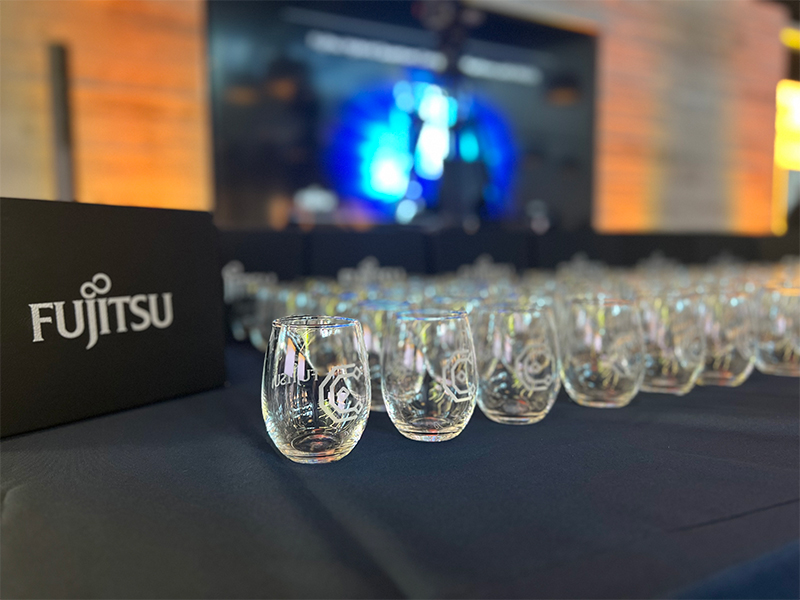
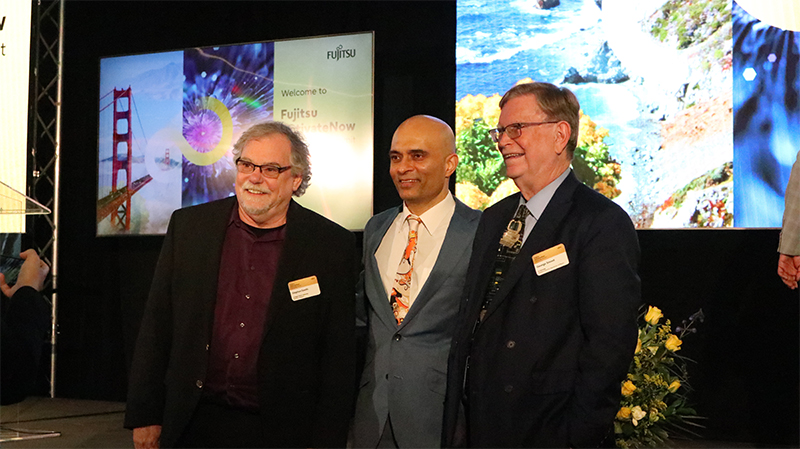
Summary
Reflecting on the Fujitsu ActivateNow Technology Summit Silicon Valley 2024, we are filled with a sense of pride and accomplishment. This event not only marked a significant milestone in our journey toward technological innovation but also served as a vibrant platform for sharing insights, sparking discussions, and fostering collaborations. With a focus on "AI-Driven Transformation: Morphing Challenges into Opportunities," we delved into the transformative power of artificial intelligence and computing, exploring their potential to reshape industries and address some of the most pressing challenges of our time.
Our summit was graced by thought leaders, industry experts, and innovators who shared their visions and breakthroughs in AI, quantum computing, and digital transformation. From the insightful keynotes by Fujitsu's Senior Executive Vice President and CTO, Vivek Mahajan, and Nobel laureate Professor George Smoot, to the dynamic panel discussions on generative AI and converging technologies, each session underscored our commitment to leveraging technology for a sustainable and human-centric future. The exhibition of cutting-edge technology showcases further highlighted our dedication to advancing towards a more sustainable future through innovation. As we close this chapter of the Fujitsu ActivateNow Technology Summit, we are inspired to continue our transformative journey with technology, driving positive change for the planet and its people.



